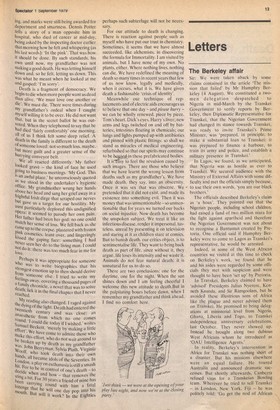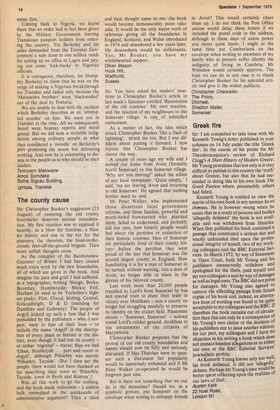Letters
The Berkeley affair
Sir: We were taken aback by some claims contained in the article 'The Mis
sion that failed' • by Mr Humphry Ber keley (4 August). We constituted a two men delegation • despatched to Nigeria in mid-March by the Transkei Government to verify reports by Berkeley, then Diplomatic Representative for
Transkei, that the Nigerian Government had changed its stance towards Transkei, was ready to invite Transkei's Prime Minister, was 'prepared, in principle, to make a substantial loan to Transkei; it was prepared to finance a harbour, to train its army and police, and establish a military presence in Transkei.'
In Lagos, we found, as we anticipated, that Nigeria was as hostile as ever to Transkei. We secured audience with the Ministry of External Affairs with some difficulty and met the officials simply because, -• to use their own words, 'you are our black brothers.'
The officials described Berkeley's claim as 'a hoax'. They pointed out that the Nigerian people, including school children, had raised a fund of two million Mara for the fight against apartheid and therefore the Nigerian Government was not about to recognise a Bantustan created by Pretoria. One official said if Humphry Berkeley were to conic to Lagos as Transkei's representative, he would be arrested.
Indeed, in some of the West African countries we visited at this time to check on Berkeley's work, we found that he and his aides were regarded by some officials they met with suspicion and were thought to have been 'set up' by Pretoria. In Transkei, Berkeley claimed to have 'advised' Presidents Julius Nyerere, Kenneth Kaunda, and Sir Ramgoolam, but he avoided these illustrious sons of Africa like the plague and never advised them on Transkei. He promised to bring delegations at ministerial level from Nigeria, Ghana, Liberia and Togo, to Transkei independence anniversary celebrations, last October. They never showed up. Instead he brought along two dubious West Africans whom he introduced as '0AU Intelligence Agents.' In reality, Berkeley's intervention in Africa for Transkei was nothing short of a disaster. But his missions elsewhere were an equal failure. He toured Australia and announced dramatic successes. But shortly afterwards, Canberra refused visas for a Transkeian Bowling team. Wherever he tried to sell Transkei in London, New York, Fiji – he was politely told: 'Go get the nod of African
states first.'
Coming back to Nigeria, we learnt there that an order had in fact been given by the Military Government barring Transkeian passport holders from entering the country. Yet Berkeley and his aides demanded from the Transkei Government a sum close to one million rands for setting up an office in Lagos and paying out some `kick-backs' to Nigerian officials.
It is outrageous, therefore, for Humphry Berkeley to claim that he was on the verge of making a Nigerian breakthrough for Transkei and failed only because the `Matanzima brothers' were 'blackmailed' out of the deal by Pretoria.
We are unable to deal with the incident which Berkeley describes as an 'attempted murder' on him. We were not in Transkei at the time. All we subsequently heard were hearsay reports and street gossip. But we did note a veritable indignation among ordinary people at what they considered a 'swindle' on Berkeley's part-promising the moon but delivering nothing. And now he is atterripting to dictate to the people as to who should be their leaders.
Tennyson Makiwane Amos Somdaka Botha Sigcau Building, Ilmtala, Transkei
The county cause
Sir: Christopher Booker's suggestion (25 August) of restoring the old county boundaries deserves serious consideration. My first reaction was to applaud it heartily, as a blow for freedom, a blow for history and one in the eye for the planners, the theorists, the head-in-theclouds, feet-off-the-ground brigade. Then more selfish thoughts arose.
As the compiler of the Bartholomew Gazetteer of Britain I had been caused much extra work by the new boundaries, all of which are given in the book. And imagine the pain and grief I had suffered, as a topographer, writing 'Slough, Berks; Beverley, Humberside; Mickle Fell, Durham (it used to be Yorkshire's high est peak); Flint, Clwyd; Stirling, Central; Kirkcudbright, D & 0 (standing for Dumfries and Galloway). The people of Argyll kicked up such a fuss that I was persuaded by the publishers — who, I suspect, went in fear of their lives — to include the name 'Argyll' in the descrip tion of every place or feature in the district, even though it had lost its county — or rather 'regional' — status; thus we had 'Oban, Strathclyde , . port and resort in Argyll', although Pitlochry was merely `Pitlochry, Tayside'. (But I dare say the people there would not have thanked us for describing their town as 'Pitlochry, Tayside, town in Perth and Kinross'.) Was all this work to go for nothing, and the book made redundant — a useless hulk embedded in the quicksands of administrative argument? Then a third and final thought came to me: the book would become immeasurably more valuable. It would be the only major work of reference giving all the boundaries in England, Scotland, and Wales introduced in 1974 and abandoned a few years later. My descendants would be millionaires. Yes, Mr Booker, you have my wholehearted support.
Oliver Mason Hook Hill, Wad hurst, Sussex Sir: You have asked for readers' reactions to Christopher Booker's article in last week's Spectator entitled 'Restoration of the old counties'. My own reaction, and the reaction of my neighbours in this Somerset village, is onç. of unbridled enthusiasm.
As a matter of fact, the idea which struck Christopher Booker 'like a flash of lightning', struck me too. But I was diffident about putting it forward. I now rejoice that Christopher Booker has shown the way.
• A couple of years ago my wife and moved our home from Avon (formerly North Somerset) to this Somerset village. 'Why are you moving?' asked the editor of our local newspaper, 'Quite simply,' I said, 'we are leaving Avon and returning to old Somerset.' He agreed that nothing further need be said.
Mr Peter Walker, who implemented those disastrous local government reforms, and those faceless, powerful and much-hated bureaucrats who planned them, failed to understand, and probably did not care, how bitterly people would feel about the partition or extinction of their historic counties. Men of Somerset are particularly fond of their county history: before the partition they were proud of the fact that Somerset was the second largest county in England. How humiliating it is for a man of Somerset to be turned, without warning, into a man of Avon, no longer able to share in the glories of his beloved county.
Last week more than 20,000 people travelled to Lord's from Somerset by bus and special train to cheer their team to victory over Middlesex — now a county no longer but struggling manfully to preserve its identity on the cricket field. Passionate shouts — 'Somerset, Somerset' — echoed round Lord's cricket ground, doubtless to the amazement of the citizens of Marylebone, Christopher Booker proposes that the revival of our old county boundaries and names should now be fully and seriously discussed. If Mrs Thatcher were to sponsor such a discussion her popularity would be immensely enhanced and if Mr Peter Walker co-operated he would be forgiven past sins.
But is there not something that we can do in the meantime? Should we, as a symbolic gesture, put Somerset on the envelope when writing to unhappy friends in Avon? This would certainly cheer them up. I do not think the Post Office unions would delay these letters if we included the postal code in the address, although in these days of union power you never quite know. I might at the same time put Cumberland on the envelope when writing to members of my family who at present suffer silently the indignity of living in Cumbria. Mr Whitelaw would certainly approve. The least we can do in any case is to thank Christopher Booker for his splendid article and give it the widest publicity. Christopher Chancellor The Priory, Ditcheat, Shopton Mallet, Somerset
Greek fire
Sir: I am compelled to take issue with Mr Kenneth Young's letter published in your columns on 14 July under the title 'Greek fire'. In the course of his praise for Mr Theodoracopulos's review of Richard Clogg's A Short History of Modern Greece, Mr Young postulates that not only is it very difficult to publish in this country the 'truth' about Greece, but also that he had succeeded in doing this in his own book The Greek Passion where, presumably, others had failed.
Kenneth Young is entitled to view the merits of his own book in any manner he so chooses. He is however wrong when he states that as a result of persons and bodies 'allegedly defamed' the book is not available and was withdrawn from libraries. When first published his book contained a passage that constituted a serious slur and wholly unfounded libel upon the professional integrity of myself, two of my working colleagues and the BBC External Services. In March 1972, by way of Statement in Open Court, both Mr Young and his publishers unreservedly withdrew and apologised for the libels, paid myself and my two colleagues a sum by way of damages as well as legal costs. The BBC did not press for damages. Mr Young also agreed to remove the offending passage from future copies of his book and, indeed, an alternative form of wording was found to be quite acceptable to my colleagues and the BBC. If therefore the book remains out of circulation then that can only be a consequence of Mr Young's own choice or the decision of his publishers not to issue another edition; for our part, my colleagues and I have no objection to his writing a book which does not contain baseless allegations as to either, our own or the BBC External Services journalistic probity. As Kenneth Young knows only too well: his book defamed. It did not 'allegedly defame. Perhaps Mr Young's time would be better spent reflecting upon the realities of our laws of libel.
Austen Kark 22 Noel Road, London Ni































 Previous page
Previous page